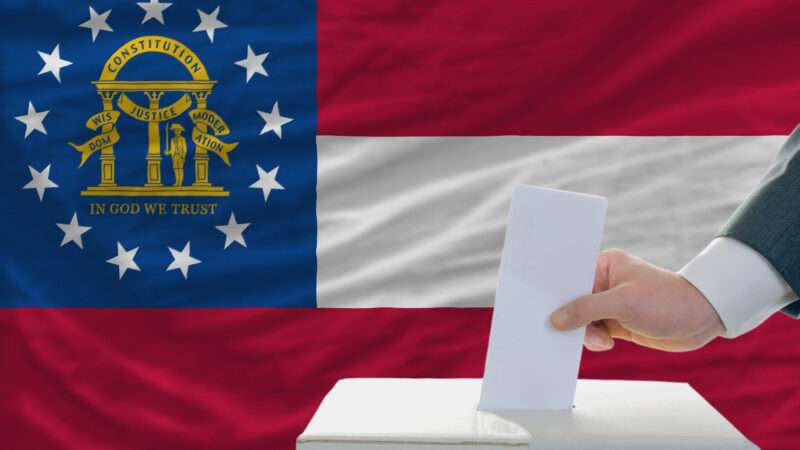
On Tuesday, voters in Georgia and Alabama cast ballots in primaries to determine their respective parties' local, state, and federal nominees for November. In Georgia, it was the first spate of federal elections since the passage of last year's controversial new voting bill, S.B. 202. The bill's opponents called it "Jim Crow 2.0," but voters this week turned out in record numbers.
S.B. 202, the "Election Integrity Act of 2021," was passed by Republican state lawmakers in the aftermath of the 2020 election. Many states, including Georgia, changed voting rules during that election cycle in attempts to mitigate the spread of COVID-19. Often, these changes were made by judges, and were challenged by local election officials, who, in some cases, struggled to comply with expanded early voting hours or more generous deadlines for returning ballots.
S.B. 202 was intended, in part, to clarify or change some of those rules. The law extended the period during which counties are required to offer early voting, and mandated at least one ballot drop box. It also imposed tougher ID requirements for absentee ballots, as well as narrowing the window in which voters can request them.
When the bill passed, opponents said it was tantamount to voter suppression. Charles Blow of The New York Times characterized the law as "Jim Crow 2.0," invoking the decades-long period when state and local laws throughout the South deprived black Americans of constitutional rights and liberties. The ACLU of Georgia called it "Georgia's Anti-Voter Law." President Joe Biden said that the law "makes Jim Crow look like Jim Eagle." The Department of Justice announced that it would sue to attempt to block the law.
Now, in the first test case, it seems that critics' worst fears did not come to pass. As of Sunday, publicly available voting data from the Georgia Secretary of State show that more than 850,000 Georgians participated in early voting, either in person or by returning an absentee ballot. This was more than double the early vote numbers from similar midterm elections in 2018. Preliminary numbers from Election Day indicate a similarly impressive in-person turnout.
Critics of the bill have responded that an uptick in votes does not mean the law did not have a suppressive effect: "It could well mean that voters overcame those hurdles, and that means that time and money were put into efforts to assure that voters could overcome those hurdles," Richard Hasen, law professor at the University of California Irvine, told The New York Times.
According to the numbers from the Secretary of State, about 56 percent of early primary ballots cast were Republican, about 43 percent were Democratic, and fewer than 1 percent were non-partisan. This might seem out of balance for a state that has drawn closer and closer to being truly half Republican and half Democratic, especially since the 2020 Democratic primary for Georgia's Senate seat saw Democratic voters cast 1,186,660 ballots.
But there was much more excitement on the Republican side of the ticket in this week's primary: Both the governor and secretary of state faced serious challengers, while the two biggest names on the Democratic side—Stacey Abrams and Sen. Raphael Warnock—did not. Abrams ran unopposed, and Warnock took over 96 percent of the vote against a single challenger.
Georgia's new laws are in line with—and, in some cases, even less restrictive than—those in place in many other states all across the country. Even if it's impossible to prove that S.B. 202 did not keep any Georgians from exercising their right to vote, it remains a problematic piece of legislation. It was seemingly passed in direct retaliation to Georgia Secretary of State Brad Raffensperger's refusal to subvert the results of the 2020 election in Georgia, and it removes the secretary as a voting member of the State Election Board. Additionally, the board can now "suspend" county election superintendents and "appoint" a replacement, who retains the power to replace election officials, including "the director of elections, the election supervisor, and all poll officers." In practice, this has resulted in Democratic local officials being replaced with Republican appointees.
Over time, that sea change may indeed turn out to negatively effect black voters. But in this primary, there is no evidence that Georgia's voter law depressed turnout for either party.
The post If Georgia's Election Law Was Supposed To Suppress the Vote, It Sure Did a Bad Job appeared first on Reason.com.







